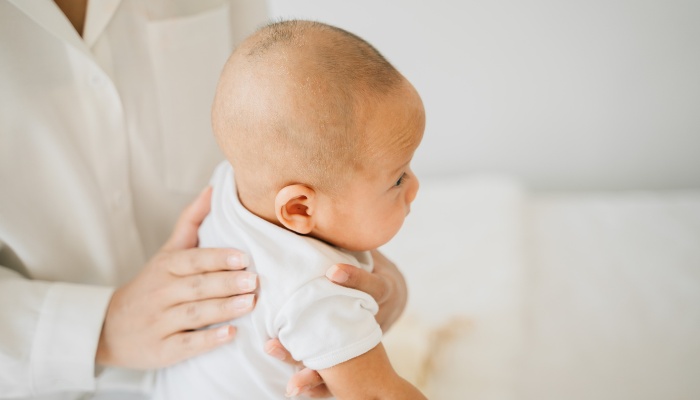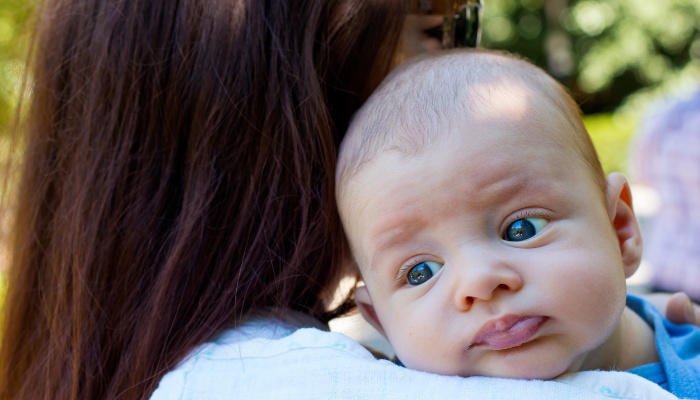During the process of learning to effectively suck and drink milk from either a bottle or while being breastfed, babies may unintentionally ingest air, resulting in the presence of small air bubbles in their stomachs.
This excess gas can be uncomfortable and painful for your little one, which is why taking time to burp your baby is an important part of the feeding process.
New parents often worry about when to burp their baby and if they are burping their baby enough.
Generally, babies should be burped after every 2-3 ounces or every time you switch breasts while breastfeeding. The number of times your little one burps or needs to be burped can vary depending on their age, their drinking efficiency, or other conditions such as colic or GERD.
If you are new to this burping thing, no worries! Let’s take a look at some of the most important things to know about burping your baby.
Burping Your Baby
Here, we will dive into the basics of burping your baby: how often to burp, what is normal, how to burp, and when to stop burping.
How Often To Burp Baby During Feeding
As you learn your baby’s feeding and burping patterns, you will know how often your baby needs to be burped.
Until then, it doesn’t hurt to follow the general guideline of burping every 2-3 ounces if bottle feeding or every time you switch breasts while breastfeeding.
However, how often your baby needs to be burped can vary depending on his/her individual needs and circumstances.
If your baby seems fussy while feeding, stop the session, burp your baby, and then resume feeding.
Some babies may require more frequent burping. Try burping your baby every ounce or every five minutes if your baby:
- Tends to be gassy.
- Spits up a lot.
- Has gastroesophageal reflux (GER).
You should also always end your feeding session with a good baby burp!
How Long To Burp a Baby
When burping your baby, you should support their head and neck with you hand and rest their body along your forearm to make sure their tummy and back are nice and straight.
Begin to rub or pat their back gently to initiate burping and help move the air bubbles along. You do not need to spend a long time burping your baby.
There is no specific length of time for which you should burp your baby; usually, a minute or two is sufficient time to get a good burp.
If your baby doesn’t burp after a few minutes, switch positions and try burping again before resuming feeding.
How Long To Burp a Newborn
When feeding a newborn, aim to burp them several times during the feeding.
With each burping session, give the baby a few soft pats on the back until a burp emerges, and then resume feeding.
How Many Burps Are Normal?
There is no “normal” amount of burps for a baby while feeding. You really just need to pay attention to their cues and watch for any signs of discomfort that could indicate your baby is not burping enough.
What if My Baby Won’t Burp After Feeding?
Not all babies burp a lot, and some need it more than others. If you have tried to burp your baby in a few different positions after feeding without any success, chances are your baby doesn’t have any air to release.
As babies get older, they become more efficient at drinking without swallowing air and do not need to burp as often.
Strive to keep your baby in an upright position for 10-15 minutes after a feeding, especially one without a final burp, in order to prevent the milk from coming back up.

Does Baby Need To Burp After Spit Up?
Spit up is not always an indication that your baby needs to be burped more. In fact, this 2014 study shows that over-burping can actually increase spit up and does not significantly lower colic events.
Signs Baby Needs To Burp
You can often tell when a baby needs to be burped because they will get squirmy and may begin pulling away during the feeding.
Babies often get fussy when they need to burp due to the discomfort of the excess gas in their little tummies.
Baby Won’t Burp After Breastfeeding
There is no need to worry if your baby will not burp after breastfeeding. It likely means that your baby has learned how to drink without inhaling excess air.
Always offer the pats and try to yield a burp; however, do not think that something is wrong if your baby doesn’t burp.
How To Burp a Newborn: Positions
There are three popular methods for burping newborns and infants. The main difference between them is how the baby is held.
For each of them, you should use a burp cloth to protect from spit up or wet burps and should use a gentle patting motion on the baby’s back to coax the burp.
Be sure to support the baby’s head and neck in each of these positions and move the baby slowly and gently.
1. Leaning
- Place a burp cloth on your shoulder and back.
- Rest your baby’s chin on your shoulder.
- Support and hold your baby in place with one hand while gently patting with the other hand.
2. Sitting
- Place a burp cloth across your lap, and place a bib on your baby.
- Sit your baby upright in your lap facing away from you. Use your palm to support the baby’s chest and your fingers to support his jaw.
- Gently pat the baby’s back with your free hand.
3. Lying on Tummy
- Put a burp cloth or towel across your lap.
- Place your baby across your knees perpendicular to your body.
- Use one hand to support your baby’s head so that it is higher than the chest.
- With your free hand, gently pat the baby’s back.
When To Stop Burping Baby
Most babies will outgrow the need to be burped between 4 and 6 months of age.
Related Questions:
Do You Burp a Newborn After Colostrum?
Most babies do not burp a lot during the first few days when they are drinking colostrum; however, still burp them for a minute or two. If you do not get a burp, no big deal.
If Baby Spits Up, Should I Continue Feeding?
Babies do not know how to regulate their appetite; therefore, it can be very easy to overfeed them.
Sometimes, spit up is an indication that a baby is full and their little tummy cannot hold any more milk.
However, spit up can also just be a normal occurrence with a burp. If your baby spits up, wait a few minutes before resuming feeding, and then offer a little at a time.
If your baby continues to spit up, try to stop the session and wait for hunger cues before feeding again.
Closing Thoughts
Burping a baby is a skill that can take some getting used to. However, once you learn the basics and with a little practice, it will come naturally for both you and your baby.
Charlynn is an educator and mom to fraternal boy/girl twins. She loves learning through the experiences she has with her littles and using her knowledge to help other moms as they embark on the journey of motherhood.

